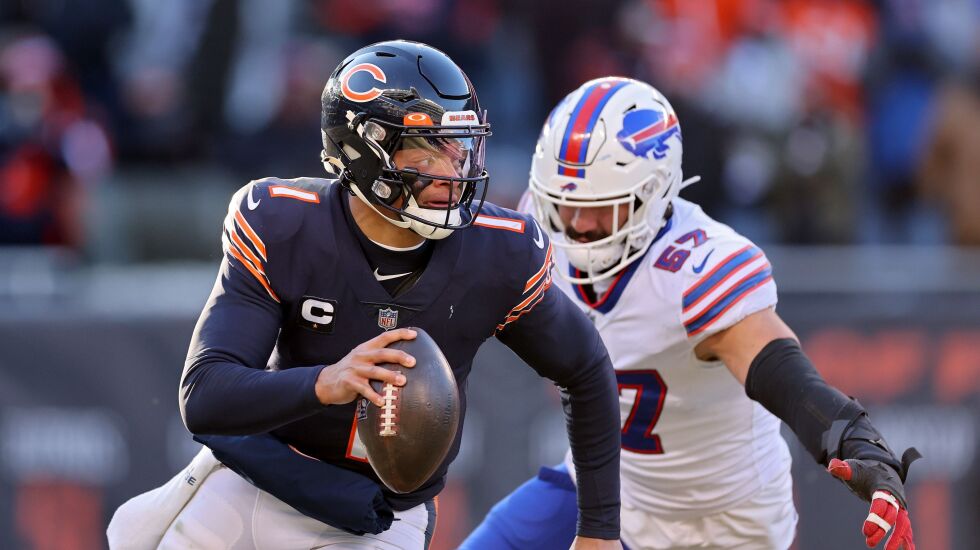
Bears quarterback Justin Fields knows he’s not going to run for 100 yards every week. But he probably has to run for more than 11.
That’s all he got in a 35-13 loss to the Super Bowl-contending Bills. The Bills’ ninth-ranked defense — almost literally with the wind at its back — focused on containing Fields in the running game and had the athletes to make it work.
Fields came into the game on a historic tear for rushing by an NFL quarterback. He was averaging 100.8 yards per game and 8.0 yards per carry in his previous eight games, becoming only the third quarterback in NFL history to rush for 1,000 yards in a season.
But he had just seven carries for 11 yards against the Bills. In fact, after rushing for seven yards on the Bears’ first offensive play from scrimmage, Fields gained no yards on six carries. One of them was an aborted play because of a bad snap that lost two yards.
“They were bringing pressure and forcing the ball where they wanted to,” tight end
Cole Kmet said. “They know if I’m lining up over them or he has another tight end unblocked . . . they’re not diving in at the run. That forces Justin to give the hand-off there multiple times.
“They did a good job. And they’ve got good athletes across the board. They came with a good plan. It’s a good team. I’m pretty sure we’ll see them go pretty far in the playoffs.”
The Bears’ offense missed Fields’ explosiveness. Fields leads the NFL with three rushes of 50 or more yards, has seven of 28 or more yards and is third among all rushers with 31 runs of 10 or more yards. Many of those runs have provided a spark to the offense, but the Bears didn’t get them against the Bills.
In theory, when opponents take Fields away, the Bears’ league-leading running game should prosper with running backs David Montgomery and Khalil Herbert. They can’t stop everybody, but the Bills did. The Bears, who came in averaging 186.9 rushing yards per game, rushed for 80 yards on 29 carries (2.8 average), their second-lowest rushing total this season.
In fact, after the Bears gained 43 yards on their first four carries — including Montgomery’s 28-yard run to the 1-yard line to set up a touchdown — they gained just 37 yards on 25 carries (1.5 average).
“The reality of it is, I’m not going to be running for 100 yards a game,” Fields said. “When the defense does a good job of taking my legs away, my job is to take a defender or two with me and allow our running backs to work.”
A week after Fields had 15 carries for 95 yards against the Eagles, the Bears were in a tougher spot against the Bills, with windy conditions that limited both teams’ passing game and enhancing the Bills’ already-tough defense. Fields was 15-for-23 passing for 119 yards, one touchdown and no interceptions for a 92.5 passer rating.
“It was crazy. It really impacted the whole game,” Fields said. “It definitely impacted the passing game, with trying to figure out which way you want to throw the ball — which way the wind is going when the gusts are up to 30, 35 mph — you just want to hopefully [use] the passing plays when it’s not that windy. You have to think about all those things when you’re calling plays like that.”







